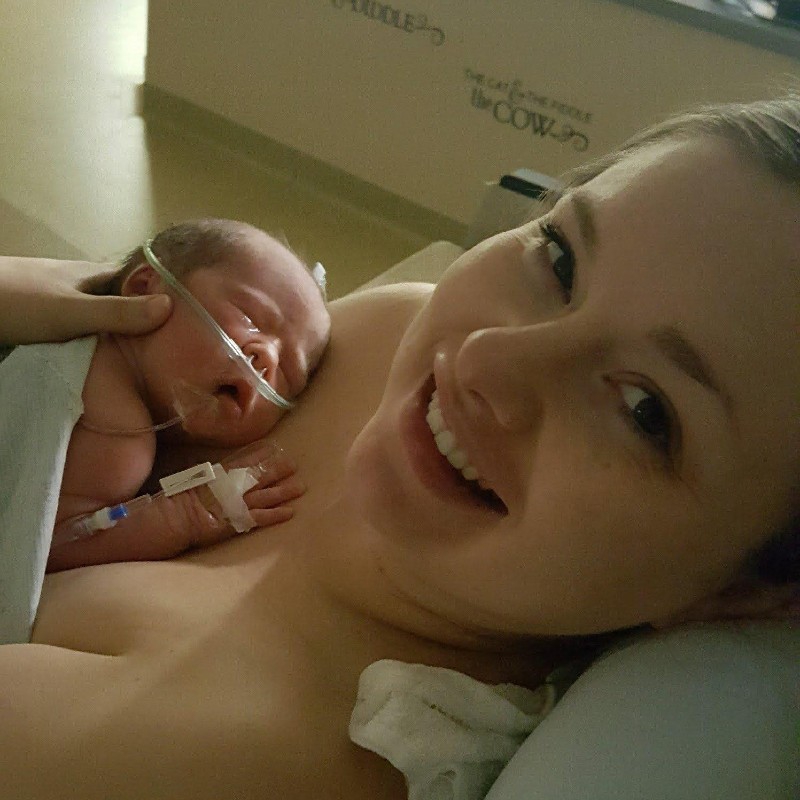Giving birth is a life altering experience, and one that comes with uncertainty and overwhelming feelings of all kinds: fear, joy, anxiety, exhilaration, exhaustion and sometimes a little or a lot of sadness. When your birth experience does not go as planned, it adds another layer of trauma and stress to an already intense situation.
Paige Raab is a physical therapist who experienced this with each of her births. “Starting your parenting in that highly medical setting, not being able to bond like you want to be able to bond, and those feelings of isolation and the mental health journey that comes along with it…it inspired me to shift the focus of my career.” Raab started working with pediatrics, seeing babies and families that have just come home from a NICU stay.

Photo provided by Paige Raab.
Many of the moms and families she interacts with express a sentiment that Raab is quite familiar with: “My baby didn’t feel like my baby.” Raab’s firstborn, Archer, had to be transferred to another hospital immediately after his birth. Her husband Cameron traveled with the baby while she remained. “I got to spend about a half hour with him before he was transferred.” Adding to the stress was the fact that they didn’t know he was going to need additional care. “A lot of NICU stays are unexpected,” says Raab, “and that adds a whole other layer of ‘this is not going how I visualized’ to it.”
Once he came home, Raab says she pushed a lot of feelings down, not addressing the trauma caused by an unplanned NICU stay. There was also the isolation of not knowing anyone else who’d been through a similar experience. So while the general family support was there, she wasn’t able to articulate the emotional support that she needed. After a second unexpected NICU stay when her son Felix was born, she began to experience post traumatic stress symptoms: flashbacks, anxiety, anger. She began seeing a therapist that specializes in birth and pregnancy trauma — spending a year and a half working through the pain of her experiences — and came out ready to help other families. “I just felt like I wanted to get to them sooner. I wanted to help prevent some of those feelings of isolation.”
The care that NICU infants are receiving is vital, and important, but it creates a separation. It’s a more difficult process to be able to hold your child — they might be intubated or have other interventions that make physical contact challenging. Families that don’t live in town, and can’t endure the financial burden of staying in a nearby hotel, often have to drive back and forth to visit, especially if the stay is long. Raab has heard from moms that didn’t have reliable transportation, and from families trying to balance having older children to care for at home, while needing to spend time in the NICU. “I started to notice that trend of moms who were not able to show up for their kids the way they wanted to.”
Her newly formed nonprofit organization, The Nest Postpartum, was born out of this desire to support NICU families. “Our main goal is to help eliminate barriers for families as much as we can. We’re starting out with essentials. We want to help pay for hotel stays, transportation, and meals.” By taking care of basic needs, it enables parents to be able to spend as much time as possible with their babies. “All of the research on NICUs and long term outcomes (indicates) that’s the best thing you can do. They’re able to start that bonding process, they’re able to start making decisions, and learn how to advocate for their child.”
Raab and her team are currently laying the groundwork for The Nest, beginning with fundraising, structuring the organization, and building community relationships. Their first fundraiser launches next week, and they hope to be able to start services in October 2021. Since Carle has the largest NICU in the area, most referrals will initially happen that way, and they are already in communication with those providers.
In these beginning stages, the best way the community can support The Nest is through giving and spreading the word, reaching out to those who have had similar experiences and might want to be involved. “Maybe you didn’t have a NICU stay, but maybe someone you know did. As I’m talking to people, everybody does know somebody.”
Raab hopes to change the narrative of the NICU stay from one of isolation to one of community support.
Follow The Nest Postpartum on Facebook or Instagram to stay informed and find opportunities to support the work they are doing.








